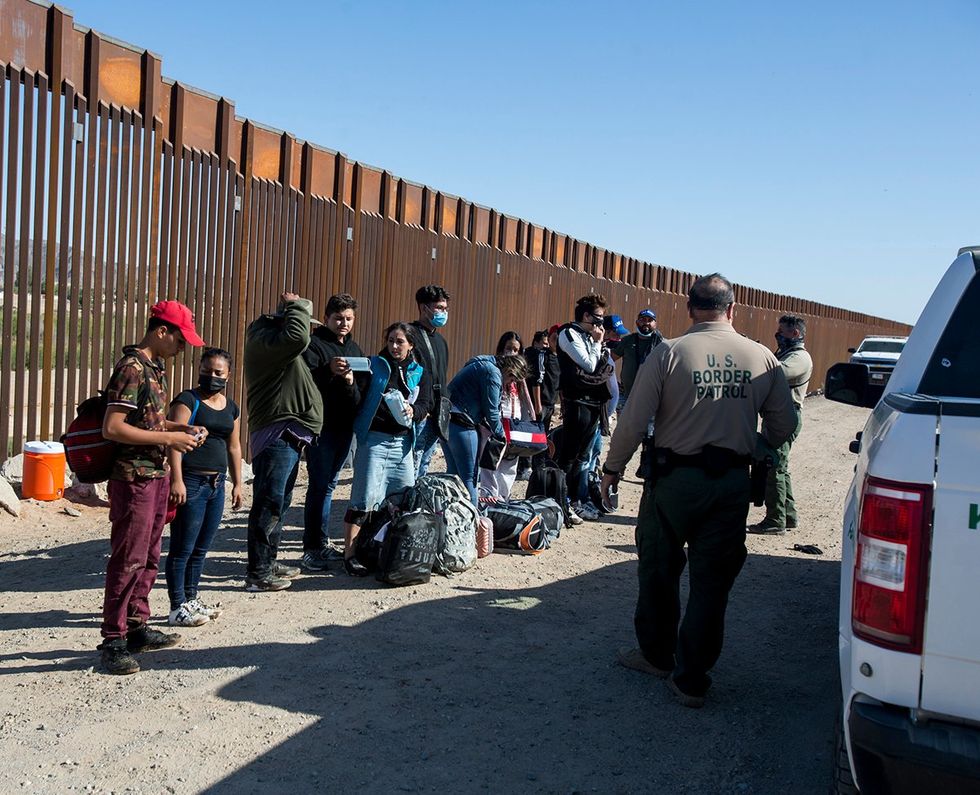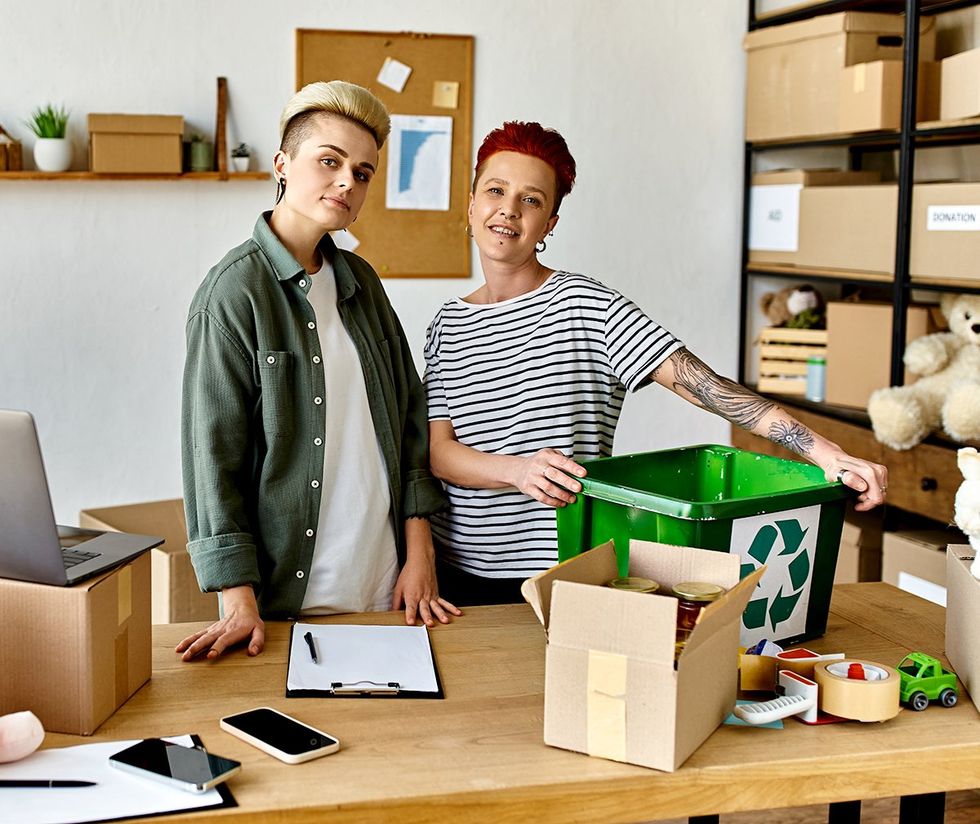A humanitarian agency in Colombia sought the guidance of a local organization supporting LGBTQ+ communities to better address the needs of Venezuelan LGBTQ+ migrants, resulting in improved responsiveness to their needs. Following the devastating 2015 earthquake in Nepal, a local LGBTQ+ organization trained humanitarian partners to understand and address the overlooked needs of LGBTQ+ communities. In Ukraine, LGBTQ+ organizations partnered with humanitarian groups to better reach those in need of protection, temporary housing, cash assistance, and other forms of life-saving support in the context of Russia's full-scale war.
What do these stories have in common? They all demonstrate that, in times of crisis, meaningful inclusion of LGBTQ+ people in humanitarian action is not only possible but critical.
 Ringo Chiu/Shutterstock
Ringo Chiu/Shutterstock
While LGBTQ+ people share common vulnerabilities with all affected populations in humanitarian crises, they also have specific and diverse needs not faced by others. These may include protection from bias-driven violence and scapegoating, access to safe transport and shelter that respects queer families and individuals, and specialized medical care from hormone treatments to HIV-related medications.
These stories and others are documented in a new joint report by Outright International and Edge Effect. In They Know What We Don't: Meaningful Inclusion of LGBTIQ People in Humanitarian Action, the authors intentionally sought out positive stories of inclusion and collaboration between LGBTQ+ organizations and humanitarian agencies with the hope of inspiring change in a sector that has long struggled to meet the needs of queer people sufficiently.
Unfortunately, the case studies documented in the report are not typical. Far too often, pre-existing stigma and discrimination leave many LGBTQ+ people left out and left behind when a crisis hits. Other factors that hinder adequate support include a lack of understanding among mainstream humanitarian agencies, hostile sociocultural, political, and legal contexts, and an unwieldy humanitarian bureaucracy.
The Outright-Edge Effect report, however, does not dwell extensively on the well-documented shortcomings of the humanitarian system. Instead, the report sourced interviews with humanitarian workers and activists and utilized case studies from Colombia, Lebanon, Myanmar, Nepal, and Ukraine. The report seeks to illuminate examples of humanitarian actors and LGBTQ+ community organizations working toward equitable partnerships to ensure timely humanitarian assistance with dignity and respect.
In one example, Mercy Corps created a remunerated partnership with Caribe Afirmativo in Colombia to reach LGBTQ+ migrants. Through this collaboration, each organization's capacity was strengthened through open, safe sharing of expertise, resulting in more effective programming. Other examples include jointly developing LGBTQ-sensitive toolkits and guidelines to enact non-discrimination, duty-of-care, and other policies at all response levels.
Across all examples is this simple fact: partnerships between LGBTQ+ organizations and humanitarian actors work best when the voices of local LGBTQ+ people are centered in programmatic decision-making.
 LightField Studios via Shutterstock
LightField Studios via Shutterstock
Among other findings, the research clarifies that strengthening inclusion cannot rely exclusively on the goodwill of internal allies within the humanitarian system. Inclusion must be institutionalized, resourced, and integrated into action plans and response strategies. In addition, inclusion must be part of larger cross-sector efforts to improve localization and decolonize aid. Humanitarian organizations are well-placed to build bridges between local LGBTQ+ organizations and humanitarian coordination structures that lead needs assessments and determine response strategies.
The report's findings also highlight some pitfalls. For example, while LGBTQ+ actors should be at the forefront of initiatives that aim to meet their needs, an overreliance on these organizations without adequate support or acknowledgment of challenges at the local level can result in fatigue and frustration. Humanitarian organizations must learn to work collaboratively with LGBTQ+ communities to harmonize their strengths, safety needs, and capacities.
Finally, it is crucial to recognize the diversity within LGBTQ+ populations and find a balance between targeted programming and sensitizing mainstream programming to meet LGBTQ+ needs. The LGBTQ+ umbrella captures various identities and experiences that may inhibit or enhance visibility, access to services, and trust in institutions. The intersecting components of individuals' identities will inform their needs, preferences, and capabilities.
The report is being published at a time when humanitarian crises are taking place globally, from Gaza to Sudan to Afghanistan. Outright and Edge Effect are well aware of addressing the humanitarian needs of LGBTQ+ people in conflict, post-conflict, and other disaster areas. This requires inclusive responses and a commitment from governments and non-governmental organizations to prevent conflict and crises.
A sincere commitment to humanitarian principles compels action toward improving outcomes for all people, including LGBTQ+ populations. It's time to dismantle the barriers that have prevented their full inclusion in humanitarian action.
Outright International works with partners around the globe to strengthen the capacity of the LGBTIQ+ human rights movement, document and amplify human rights violations against LGBTIQ people, and advocate for inclusion and equality.
Edge Effect strives to ensure that the rights, needs, and strengths of people with diverse sexual orientations, gender identities and expressions, and sex characteristics are addressed within the humanitarian and development sectors.
Voices is dedicated to featuring a wide range of inspiring personal stories and impactful opinions from the LGBTQ+ and Allied community. Visit Advocate.com/submit to learn more about submission guidelines. We welcome your thoughts and feedback on any of our stories. Email us at voices@equalpride.com. Views expressed in Voices stories are those of the guest writers, columnists and editors, and do not directly represent the views of The Advocate or our parent company, equalpride.


 Ringo Chiu/Shutterstock
Ringo Chiu/Shutterstock LightField Studios via Shutterstock
LightField Studios via Shutterstock















































































